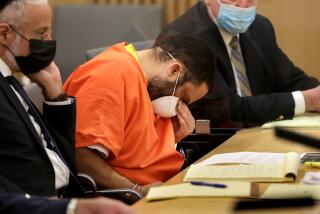Youth to Be Tried as Adult in Fatal Alley Shooting
Dubbing him “an entrenched member of a gang” who has shown an escalating pattern of crime since the age of 8, a juvenile court judge told 16-year-old Hugo David Gomez that he will be tried as an adult in connection with the dead-end alley shooting that killed 3-year-old Stephanie Kuhen in September.
“The pattern and escalation . . . of his behavior over the past years, culminating in this crime, indicate there is little likelihood he can be rehabilitated” under Juvenile Court jurisdiction, Judge Jaime R. Corral said Wednesday.
Gomez is accused of firing one of the weapons used in the fusillade on a car that police say turned the wrong way down a Cypress Park alley Sept. 17. The shooting, which also wounded Kuhen’s 2-year-old brother and a 25-year-old driver, sent chills through the city and reverberated nationwide as an example of random urban violence on streets given over to gangs.
The issue of juvenile culpability has since risen on political agendas, with Gov. Pete Wilson and Los Angeles Dist. Atty. Gil Garcetti this week backing plans to lower the age at which teenagers can be subject to prosecution as adults.
Under such a plan, 14-year-olds could be prosecuted as adults for serious crimes. Current law allows youths 16 or older to face adult charges.
Garcetti’s office is expected to refile murder and attempted murder charges against Gomez, one of six suspects in custody in connection with the shooting. A fitness hearing for two other juveniles was postponed until Jan. 31, and three adults await hearings in Criminal Court.
Gomez was first arrested at the age of 8 on petty theft charges and has had a steady series of brushes with the legal system ever since, according to court records and attorneys. His most serious conviction was for possession of rock cocaine, a charge for which he served 26 weeks in a county camp in 1994.
Even Gomez’s attorney, Glenn Stevens, acknowledged in court that his client’s checkered past, which also includes curfew and probation violations, presented a problem when arguing that he should be kept in Juvenile Court. Judge Corral agreed.
Handcuffed and wearing county-issue orange coveralls, Gomez sat silently during the half-hour hearing, which swept quickly through five criteria used to measure whether he should remain in Juvenile Court. Failure in any one would send him to adult court. He failed four.
Corral ruled that Gomez was not amenable to rehabilitation, showed a degree of criminal sophistication, had a serious record of crimes and failed to respond to efforts to rehabilitate him over the last two years.
The court seemed sympathetic with defense attorney Stevens’ theory that there was still sufficient time--nine years--for the juvenile system to attempt to rehabilitate Gomez. But it agreed with Deputy Dist. Atty. Tom O’Brien’s contention that Gomez “appears to be an individual who is thumbing his nose at the court and at the juvenile system.”
Corral said in his ruling: “He has moved, and is continuing to move, toward a lifestyle of criminality.”
Neither Gomez’s mother nor stepfather, both of whom were present for the hearing, would comment afterward.
Corral ordered Gomez to be held at the Eastlake juvenile detention facility, and set bail at $3 million. He gave the district attorney’s office until Tuesday to file its charges for adult court.
More to Read
Sign up for Essential California
The most important California stories and recommendations in your inbox every morning.
You may occasionally receive promotional content from the Los Angeles Times.











